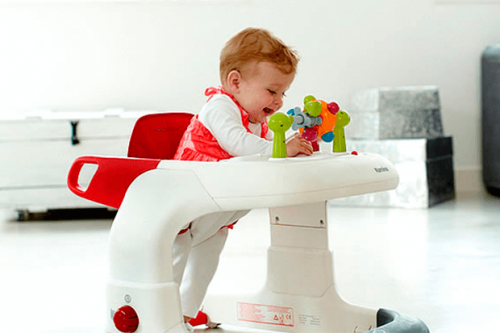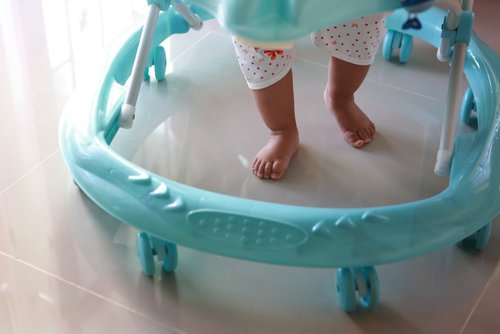Pros and Cons of Allowing Children to Use Baby Walkers

On the one hand, baby walkers surround your baby and include safety straps to keep your child from falling.
At the same time, they have small wheels underneath that allow your baby to move around freely in any direction.
3 advantages to using baby walkers
Boost your little one’s sense of independence
When a child starts to crawl or tries to walk without assistance, we as parents watch their every move. And in a way, this protective intention restricts our little one’s movements and independence.
However, when children are just beginning to crawl and walk, they need to be able to move around in a safe way.
If your child uses a baby walker, you don’t have to hover constantly, and your child can be more independent. Baby walkers help to offer security and come with guarantees.
Parents have more time for other activities
One of the reasons that moms and dads use baby walkers is because they need time to do other things.
This is important to keep parents from becoming overwhelmed. And of course, it allows them to carry our necessary tasks around the house like cooking, cleaning, etc.
Produces fun and entertainment for little ones
If you really think about it, a baby walker is like a toy for your baby. Growing babies can have hours of fun in their walkers as they experiment with their first steps and enjoy the sensation of rolling around.
And of course, these apparatuses come in a variety of bright colors and often include objects for your child to play with.
Some baby walkers double as activity centers that complement your child’s learning. Shapes, colors, sensations and even sounds are built into the walkers to make them more attractive to little ones.
Without a doubt, your child’s interactions with these accessories help contribute to her cognitive development.

3 disadvantages of using baby walkers
Contrary to popular belief, these walkers don’t stimulate the ability to walk
When your child uses a baby walker, she is receiving artificial assistance. Therefore, whatever movements they manage to accomplish while in the walker don’t compare to actual walking.
In other words, using a walker doesn’t challenge your child enough to dominate her movements. Walkers support a child’s weight, making the walking experience incomplete. In fact, some theories indicate that the use of walkers can actually produce distortions.
While there are many advantages to using walkers, children really don’t learn to walk just by using walkers. Yes, your child’s leg muscles are getting a workout, but with assistance.
Therefore, if you decide to use a walker with your child, be careful to use good measure. You shouldn’t leave your child in his walker for long periods of time, or too frequently.
While the use of a baby walker may give you the freedom to focus on other things, excessive use is counterproductive. Your child also needs to attempt walking without assistance.
“A baby walker is like a toy for your baby. Growing babies can have hours of fun in their walkers as they experiment with their first steps and enjoy the sensation of rolling around.”
Walkers can cause a delay in crawling and walking
The transition from crawling to walking occurs in the time period when most parents implement the use of walkers.
Don’t forget that, although your little one’s movements are a bit clumsy, they’re a necessary part of our child’s motor development.
When you place your child in a walker, you delay this transition and may even obstruct your child’s development.
It’s very important that parents allow their child to properly experience each developmental stage and face each developmental milestone. Walking isn’t just a question of mobility, but of muscular development.

Baby walkers keep your child from falling, and this is also part of your little one’s development
No parent wants their children to get hurt or fall down when taking his first steps. But you need to be aware that falling, to some extent, is an important part of your child’s development.
It’s true that falling down can hurt, and it represents a sense of danger and loss of control. However, it’s an experience that allows your child to learn how to handle himself in regards to his surroundings and gravity itself.
Therefore, we want to point out that walkers aren’t the only problem. Overprotection is also an obstacle. Some parents are afraid to let go of their kids and let them walk on their own.
Of course, you need to make sure the environment is free from danger and supervise your little one at all times. However, you also need to let your child learn to walk naturally and gain confidence in this new ability.
In conclusion, the use of baby walkers can alter our children’s development. Nevertheless, there is no great danger in allowing your child to have fun using a walker from time to time.
This text is provided for informational purposes only and does not replace consultation with a professional. If in doubt, consult your specialist.








